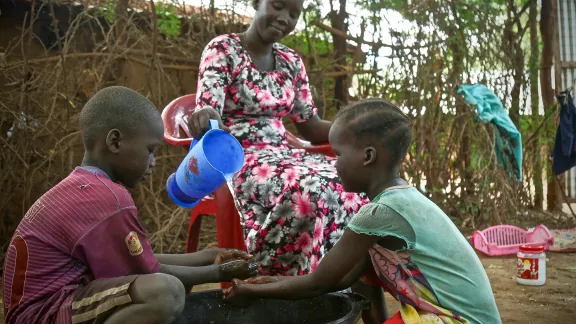
A woman washes her childrenâs hands in Kakuma refugee camp, Kenya. LWF has reinforced hygiene education to prevent a spread of COVID-19 in the camp. Photo: LWF/ P. Omagwa
Gender impact assessment shows rising inequality
(LWI) - An increased workload for women, more violence against women and children, and neglect of people living with disabilities: these are the main impacts of the COVID-19 pandemic on gender for refugees and internally displaced persons in camps in Kenya and Somalia respectively, according to a study of the Lutheran World Federation (LWF) country program in Kenya-Djibouti-Somalia.
The purpose of the assessment was to evaluate and generate information on the impact of the COVID-19 pandemic on refugees and host communities, with a specific focus on the gender dimension. It was conducted with 550 people in and around the Kakuma and Dadaab refugee camps, in urban areas of Nairobi, and in Kismayu, Somalia. The findings are used to adapt the program work, but also shared with government and NGO partners to discuss gender responsive programming in this particular emergency.
Violence and neglect
The sanitary situation in the camps is under control, although according to UN sources, both Kakuma and Dadaab were declared hotspots in October. Due to misconceptions about the spread of the virus, people were initially slow to apply proper hygiene. "Today, more handwashing facilities and information campaigns have significantly improved the level of hygiene in the camps", LWF Kenya Advocacy Officer Lilian Kantai said.
The assessment however revealed many secondary effects of the pandemic, which were caused by lockdowns, interruptions of supply chains and school closures.
Following a disturbing global trend, the report indicates a rise in domestic violence and teen pregnancies. In Dadaab, the cases of Female Genital Mutilation (FGM) spiked during the lockdown in the spring. The report also notes an increase in sexual violence, not only against girls, but also against boys.
Children with disabilities in Kismayu, Somalia suffered neglect, as their mothers "with increased duties of taking care of other children, end up neglecting the one with disabilities", Kantai noted.
Unequal work division
Overall, the lockdowns and closures caused an increased workload for women and girls. "Women are often the main caregivers in their homes in these communities. Given that the division of work is already unequal, it meant that Covid-19 further exposed the vulnerabilities and very negative effects on women's opportunities due to the large burden of unpaid care work that fell upon them," Kantai elaborates.
Male spouses and boys did not share in the work equally. On the contrary, school closures and team sports suspension led to more boys being idle and engaging in unruly behavior and drug abuse, the report notes. "There is a clear opportunity to re-think the youth engagement," says Kantai. "We overly rely on activities that require physical contact, like sports and dance. When physical meetings are restricted, however, young people have no way to spend their energy."
LWF also had to take steps to ensure girls could follow the radio school lessons. Not only did the assessment find girls busy doing household chores instead of studying, but access to technical equipment in many families also was considered a male domain. While the LWF team plans to invest more into telecommunication infrastructure, "there is a need to consider the challenges facing women around access, technical literacy, and ownership," Kantai says. The LWF teams already prepare campaigns to encourage students' return to school, as they expect a high drop-out rate.
New role for the men
While the impact on women and girls seems very clear, the report notes various trends for how the pandemic affects men. Across all the cultures represented in the refugee community, they are seen as breadwinners and working outside the home. The refugee situation already changed the work of men in pastoralist societies towards trade and shop-keeping. As lockdowns interrupted value chains and the refugee community's purchasing power was lower, men could not continue their work. Also, many livelihood activities target women to level the fact that men already have established income sources, Kantai explains.
In light of these events and situations, we might need to re-assess our vulnerability criteria for specific groups, to still enable equal access to resources.
The COVID-19 pandemic interrupted businesses outside the home while putting the home-based businesses many women engage in at an advantage. "Some men now also expressed interest in hairdressing and tailoring training," the report notes.
"The pandemic has changed the life situation for many," says Caroline Tveoy, LWF World Service gender focal point. “In light of these events and evolving situations, re-assessing how various groups score on our vulnerability criteria, ensuring that we capture and address new vulnerabilities among both men and women, is a vital part of ensuring equitable access to resources.”
LWF in Kenya-Djibouti-Somalia provides education, protection and livelihoods support to refugees and their hosts. 100,000 refugee children learn in schools managed by LWF. With youth activities like “Kakuma Got Talent” and “Kakuma Premier League”, LWF engages thousands of young refugees in sports and cultural activities, offering them opportunities to explore their talents and to also attract attention by talent scouts outside the camp.
A special focus lies on encouraging girls’ education. LWF conducts campaigns to enroll girls in primary and secondary schools, and set up child rights clubs which advocate against child abuse and early marriage. Please support our work!


